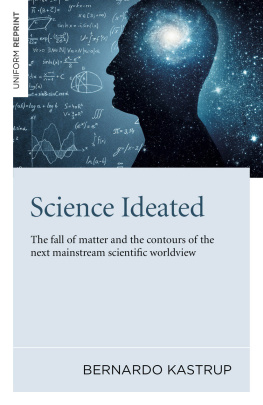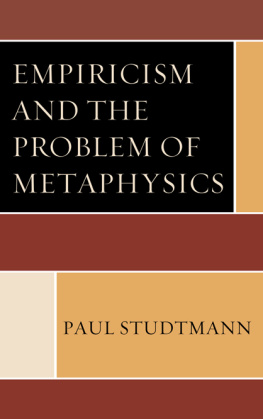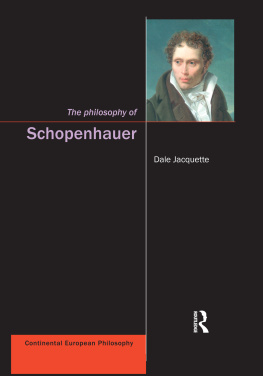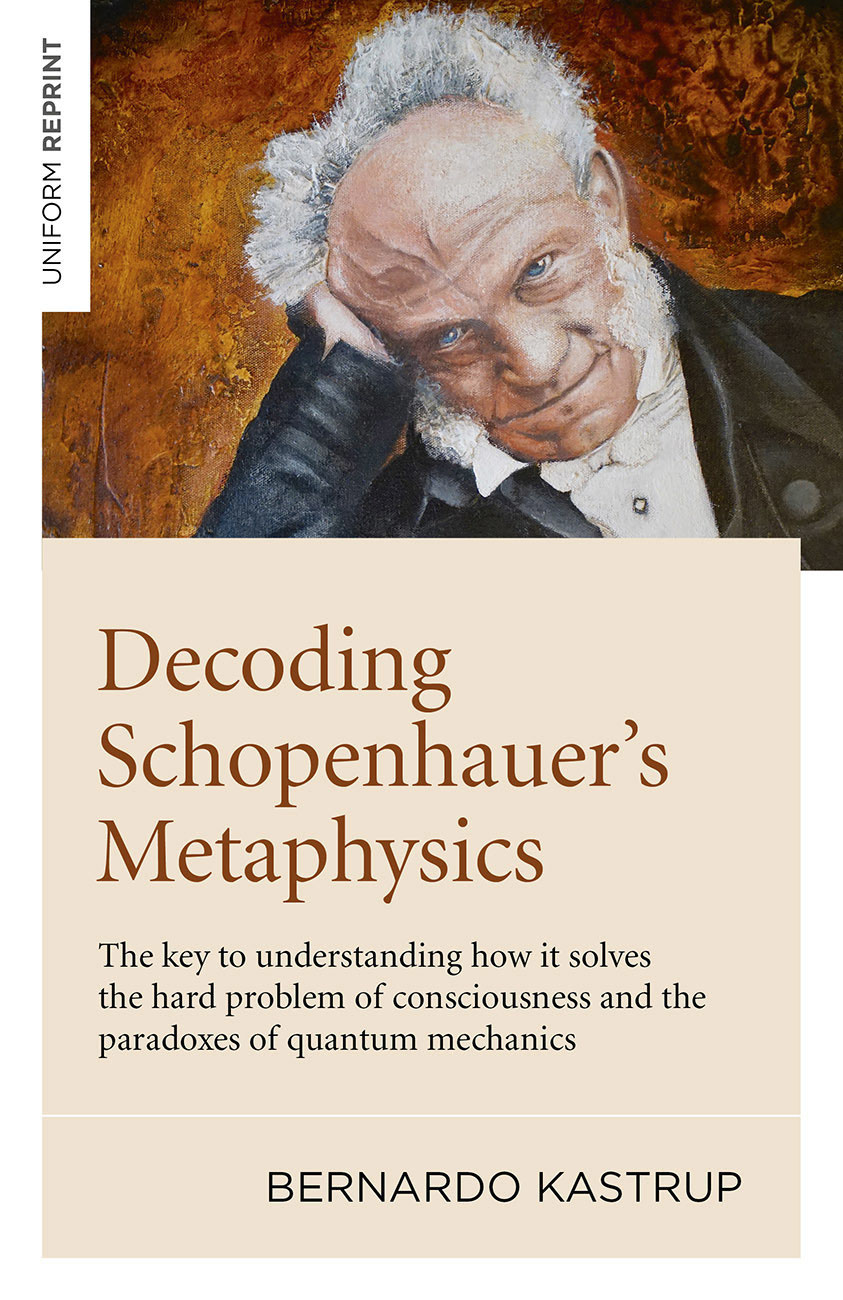Decoding Schopenhauers Metaphysics
The key to understanding how it solves the hard problem of consciousness and the paradoxes of quantum mechanics
Decoding Schopenhauers Metaphysics
The key to understanding how it solves the hard problem of consciousness and the paradoxes of quantum mechanics
Bernardo Kastrup
Winchester, UK
WWashington, USA
First published by iff Books, 2020
iff Books is an imprint of John Hunt Publishing Ltd., No. 3 East Street, Alresford,
Hampshire SO24 9EE, UK
www.johnhuntpublishing.com
www.iff-books.com
For distributor details and how to order please visit the Ordering section on our website.
Bernardo Kastrup 2018-2019
Cover image: portrait of Arthur Schopenhauer. Artwork and photography by Selenes Art (http://selenesart.blogspot.com/), copyright 2019 by Selenes Art. Used with permission.
All quotations in this book are believed, in good faith, to meet Fair Use and Fair Dealing criteria.
ISBN: 978 1 78904 426 3
978 1 78904 427 0 (ebook)
Library of Congress Control Number: 2019941535
All rights reserved. Except for brief quotations in critical articles or reviews, no part of this book may be reproduced in any manner without prior written permission from the publishers.
The rights of Bernardo Kastrup as author have been asserted in accordance with the Copyright, Designs and Patents Act 1988.
A CIP catalogue record for this book is available from the British Library.
Design: Stuart Davies
UK: Printed and bound by CPI Group (UK) Ltd, Croydon, CR0 4YY
US: Printed and bound by Thomson-Shore, 7300 West Joy Road, Dexter, MI 48130
We operate a distinctive and ethical publishing philosophy in all areas of our business, from our global network of authors to production and worldwide distribution.
Contents
Guide
Other books by Bernardo Kastrup
Rationalist Spirituality: An exploration of the meaning of life and existence informed by logic and science
Dreamed up Reality: Diving into mind to uncover the astonishing hidden tale of nature
Meaning in Absurdity: What bizarre phenomena can tell us about the nature of reality
Why Materialism Is Baloney: How true skeptics know there is no death and fathom answers to life, the universe, and everything
Brief Peeks Beyond: Critical essays on metaphysics, neuroscience, free will, skepticism and culture
More Than Allegory: On religious myth, truth and belief
The Idea of the World: A multi-disciplinary argument for the mental nature of reality
The perfected masterpiece of a truly great mind will always have a profound and vigorous effect on the whole human race, so much so that it is impossible to calculate to what distant centuries and countries its enlightening influence may reach.
Arthur Schopenhauer, in The World as Will and Representation (1818)
We philosophers ... are no thinking frogs, no objectifying and registering devices with frozen innardswe must constantly give birth to our thoughts out of our pain and maternally endow them with all that we have of blood, heart, fire, pleasure, passion, agony, conscience, fate, and disaster. Lifeto us, that means constantly transforming all that we are into light and flame, and also all that wounds us ... Only great pain is the liberator of the spirit.
Friedrich Nietzsche, in The Gay Science (1882)
Before we can discern the new, we must know the old. The adage that everything has already happened, and that there is nothing new under the sun (and the moon), is only conditionally correct. It is true that everything has always been there, but in another way, in another light, with a different value attached to it, in another realization or manifestation.
Jean Gebser, in The Ever-Present Origin (1966)
Born in Danzigpresent-day Gdaskto German-Dutch parents in 1788, Arthur Schopenhauer gained recognition as a philosopher only in the last decade of his life, in the mid-19th century. His main work, The World as Will and Representation, came to light precisely 200 years before I started writing the present book.
Today, Schopenhauer is best known for his psychology, ethics, aesthetics and prose style. When it comes to metaphysics, however, his philosophy has been considered so obviously flawed that some people have doubted whether he really means it (Janaway 2002: 40). This is tragic, for I believe Schopenhauers most valuable legacy is precisely his metaphysical views: they anticipate salient recent developments in analytic philosophy, circumvent the insoluble problems of mainstream physicalism and constitutive panpsychism, and provide an avenue for making sense of the ontological dilemmas of quantum mechanics. As I shall soon argue, there is certainly nothing obviously flawed about his views; much to the contrary. Had the coherence and cogency of Schopenhauers metaphysics been recognized earlier, much of the underlying philosophical malaise that plagues our culture todaywith its insidious effects on our science, cultural ethos and way of lifecould have been avoided.
With the present book, I hope to contribute to changing this regrettable state of affairs. In the pages that follow, I offer a conceptual frameworka decoding keyfor interpreting Schopenhauers metaphysical arguments in a way that renders them mutually consistent and compelling. With this key in mind, it is my hope that even those who have earlier dismissed Schopenhauers metaphysics will be able to return to it with fresh eyes and at last unlock its sense.
I admittedly interpolate Schopenhauers assertionsi.e. I fill in the gaps in his argumentin a manner that some may consider too, well, creative. Let me acknowledge upfront that I may, in some sense, be guilty of this. In my defense, however, I offer the following contention: if one (re-)reads Schopenhauers words under the light of the interpretation elaborated upon here, one will find it difficult to imagine that Schopenhauer could have meant anything substantially different from what I posit. So let my interpretation be judged not by the wording of isolated passages of Schopenhauers writings, but by how well it brings Schopenhauers overall metaphysical argument together in a coherent, unifying and clarifying way.
I only truly discovered Schopenhauers metaphysics after having fleshed out my own views on the nature of reality; a decade-long efforttotaling seven bookscompleted with The Idea of the World. I thus brought to bear on my read of Schopenhauer an extensive preexisting background of related ideas and insights.
Two inferences could then reasonably be made from this confession: firstand on a positive notethat my own work equipped and primed me for discerning the intended meaning of Schopenhauers contentions, despite his relatively loose and seemingly contradictory use of words. After all, I had just spent years wrestling with the same problems he wrestled with, working out similar solutions, and could thus not only understand but also recognize Schopenhauers contentions. Secondand this time on a negative noteit could also be argued that my prior metaphysical work imparts a structural bias in my efforts to interpret Schopenhauer: I am primed to read into his words a reflection of my own views.















